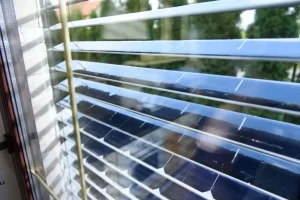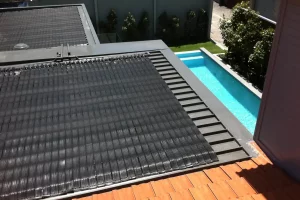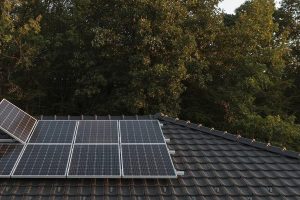As the demand for clean and sustainable energy continues to rise, homeowners are exploring various options to harness the power of the sun. One compelling choice is the use of ground-mounted solar panels.
Unlike their rooftop counterparts, ground-mounted solar panels offer distinct advantages and opportunities for homeowners looking to maximize solar energy production.
In this article, we delve into the world of ground-mounted solar panels at home, exploring their benefits, considerations, installation process, and practical tips for achieving optimal performance.
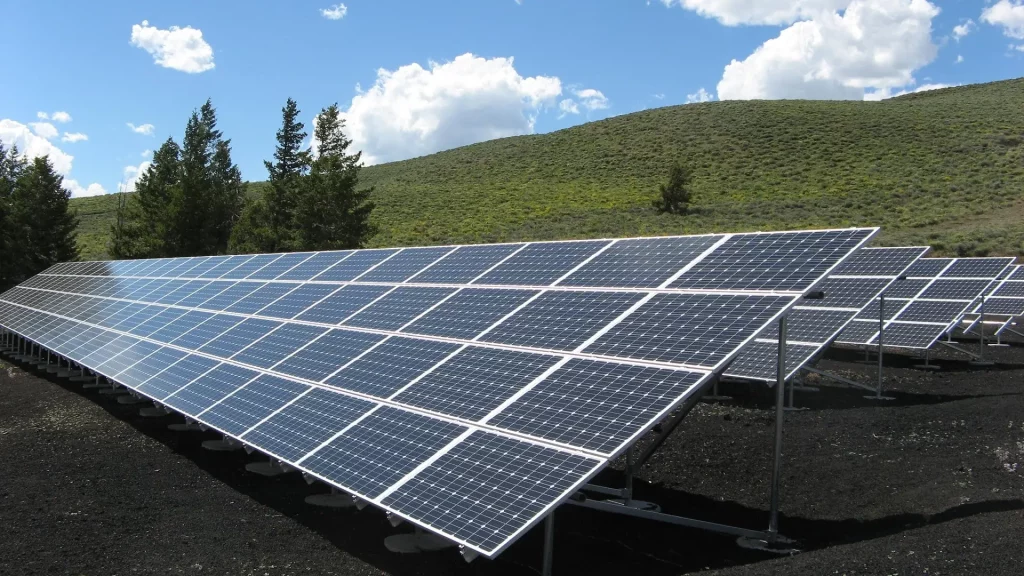
What are ground mounted solar panels
Ground-mounted solar panels, as the name suggests, are solar panel systems that are installed directly on the ground instead of being mounted on rooftops or other structures. They are commonly used in situations where there is ample available space, such as open fields, large properties, or commercial installations:
- Ground-mounted solar panel systems typically consist of a framework of metal racks or poles that securely hold the solar panels at an optimized tilt angle for maximum sunlight absorption. The installation process involves anchoring the racks or poles into the ground and connecting the panels to the supporting structure.
- These systems offer flexibility in orienting and tilting the solar panels to optimize their alignment with the sun’s path for optimal energy production. Adjusting the tilt angle and azimuth can be done during installation to maximize sunlight exposure throughout the year.
- Ground-mounted solar panel systems often offer better performance compared to rooftop installations due to factors such as optimal tilt angle, minimal shading, and increased air circulation around the panels. This can result in higher overall energy production and improved system efficiency.
- Solar panels used on ground are generally easier to access for maintenance and cleaning compared to rooftop installations. Cleaning can be done more conveniently, and regular inspections and maintenance tasks, such as checking connections and removing debris, can be performed more easily.
Ground mounted solar panel system cost
Ground-mounted systems may require additional costs compared to rooftop installations, as they involve land preparation, foundation or racking systems, and potential wiring or trenching for electrical connections. However, ground-mounted systems can benefit from reduced installation complexities, such as avoiding rooftop access and potential structural modifications.
What are benefits for using ground mounted solar panels at home
Using ground-mounted solar panels at home offers several benefits.
Optimal Sunlight Exposure
Ground-mounted solar panels can be strategically positioned to maximize sunlight exposure throughout the day. Unlike rooftop installations that may be limited by shading from nearby structures or trees, ground-mounted panels can be placed in an open area, ensuring optimal sunlight absorption and energy production.
Flexibility in System Size and Expansion
Ground-mounted systems provide more flexibility in system sizing compared to rooftop installations. Homeowners have the freedom to design and install a solar panel system that meets their specific energy needs. Additionally, ground-mounted systems can be easily expanded in the future if energy requirements increase.
Enhanced Performance and Efficiency
Ground-mounted solar panels typically offer improved performance and efficiency compared to rooftop installations. They can be installed at an optimal tilt angle and orientation, allowing for better alignment with the sun’s path. This results in higher overall energy production and increased system efficiency.
Easy Maintenance and Cleaning
Ground-mounted panels are easily accessible, making maintenance and cleaning tasks more convenient. Regular cleaning of the panels to remove dirt, dust, and debris can be done without the need for specialized equipment or climbing on the roof.
Roof Preservation
Installing solar panels on the ground eliminates the need for mounting structures on the roof, preserving the integrity and lifespan of the roof. This can be beneficial in situations where the roof is not suitable for solar panel installation or when homeowners want to avoid potential roof modifications.
Aesthetics and Design
Ground-mounted solar panels can be designed in a way that complements the overall aesthetics of the property. Homeowners have more flexibility to customize the installation and integrate it harmoniously with the landscape or architectural features of their home.
Simplified Installation and Maintenance
Ground-mounted systems typically involve simpler installation processes compared to rooftop installations. There is no need for structural assessments, modifications, or potential complications associated with roof-mounted installations. Additionally, maintenance tasks, such as inspection and cleaning, are easier and safer to perform on ground-mounted systems.
Land Utilization
Ground-mounted solar panels allow homeowners to utilize available land space effectively. This can be particularly advantageous for properties with large or unused land areas, providing an opportunity to generate clean energy while maximizing land use efficiency.
While ground-mounted solar panels may require additional land space and initial investment compared to rooftop installations, their benefits in terms of performance, flexibility, and maintenance convenience make them a compelling choice for homeowners seeking to maximize solar energy production and reduce their carbon footprint.
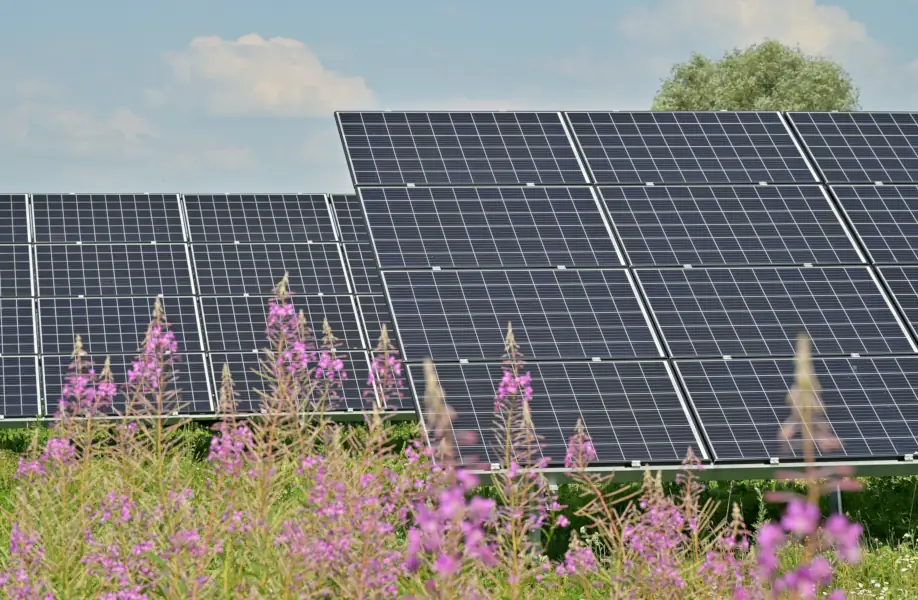
What are disadvantages of using ground mounted solar panels at home
While ground-mounted solar panels offer numerous advantages, it’s important to consider the potential disadvantages as well. Here are some disadvantages of using ground-mounted solar panels at home.
Land Requirements
Ground-mounted solar panels require a significant amount of land space, which may not be readily available for all homeowners. If you have limited land or live in densely populated areas, finding suitable space for the installation may be challenging.
Land Use and Aesthetics
Installing ground-mounted solar panels may impact the use and aesthetics of your land. The panels can occupy usable space, limit landscaping possibilities, and alter the overall appearance of your property. It’s important to consider the visual impact and potential limitations on land use before opting for ground-mounted panels.
Installation Complexity
While ground-mounted systems are generally simpler to install than rooftop installations, they still require careful planning, foundation or racking systems, and proper wiring. Preparing the land and securing the panels may involve additional time, cost, and coordination compared to rooftop installations.
Costs
Ground-mounted solar panels can incur additional costs compared to rooftop installations. Land preparation, excavation, and foundation construction may be required, increasing the overall installation expenses. Additionally, trenching or underground wiring may be necessary to connect the panels to your home’s electrical system.
Permits and Regulations
Depending on your location, installing ground-mounted solar panels may require obtaining permits and complying with local regulations. This can add additional time, paperwork, and costs to the installation process. Familiarize yourself with the specific permitting requirements in your area before proceeding.
Maintenance Challenges
While ground-mounted panels are more accessible for maintenance and cleaning, they can also be exposed to certain challenges. Ground-mounted panels may accumulate debris, such as leaves or vegetation, more easily than rooftop installations. Regular cleaning and upkeep may be required to ensure optimal performance.
Potential Ground Interference
Ground-mounted panels are susceptible to ground-related issues, such as flooding, standing water, or uneven terrain. These factors can impact the stability and efficiency of the system. Proper site assessment and preparation are essential to mitigate any potential ground interference.
It’s important to carefully evaluate these disadvantages alongside the benefits when considering ground-mounted solar panels for your home. Assess your specific circumstances, available land, aesthetic preferences, and budget to make an informed decision that aligns with your energy goals and requirements.
Should you choose ground mounted or roof mounted solar panels at home
Choosing between ground-mounted and roof-mounted solar panels depends on several factors specific to your home and preferences. Here are some considerations to help you make a decision:
- Available Space. Assess the available space on your property. If you have ample open land with unobstructed sunlight, ground-mounted panels may be a viable option. On the other hand, if you have limited land but a suitable roof area, rooftop panels may be more practical.
- Orientation and Shading. Consider the orientation of your property and the potential for shading. Rooftop installations may be advantageous if your roof has optimal sun exposure throughout the day without significant shading from nearby structures or trees. Ground-mounted panels allow for more flexibility in orientation and tilt adjustments to maximize sunlight absorption.
- Roof Condition. Evaluate the condition and suitability of your roof for solar panel installation. If your roof is old, damaged, or needs replacement in the near future, it may be more practical to opt for ground-mounted panels to avoid potential roof modifications or the need to remove and reinstall panels during roof maintenance.
- Aesthetics. Consider the visual impact and aesthetic preferences. Ground-mounted panels can alter the appearance of your property and may not be suitable if you prioritize maintaining the original aesthetics of your home. Rooftop panels, on the other hand, are less visually intrusive and can blend seamlessly with the roof.
- Cost Considerations. Compare the costs associated with ground-mounted and rooftop installations. Ground-mounted panels may require additional expenses such as land preparation, foundation construction, or trenching for wiring. Rooftop installations, although they may require mounting and wiring considerations, may be more cost-effective due to utilizing existing structure and wiring.
- Maintenance and Accessibility. Evaluate the ease of maintenance and accessibility for both options. Ground-mounted panels are typically more accessible for cleaning and maintenance tasks, while rooftop installations may require more effort and safety precautions for access.
- Local Regulations and Permits. Research and understand the local regulations, building codes, and permits required for solar panel installations. Some areas may have specific guidelines or restrictions that influence your choice between ground-mounted or rooftop installations.
Conclusion
Ground-mounted solar panels provide an attractive option for homeowners seeking to harness solar energy efficiently and effectively. They provide an excellent alternative when rooftop installations are not feasible due to shading, roof condition, or aesthetic concerns.
However, it’s important to consider factors such as available land space, costs, local regulations, and individual preferences when making a decision.

